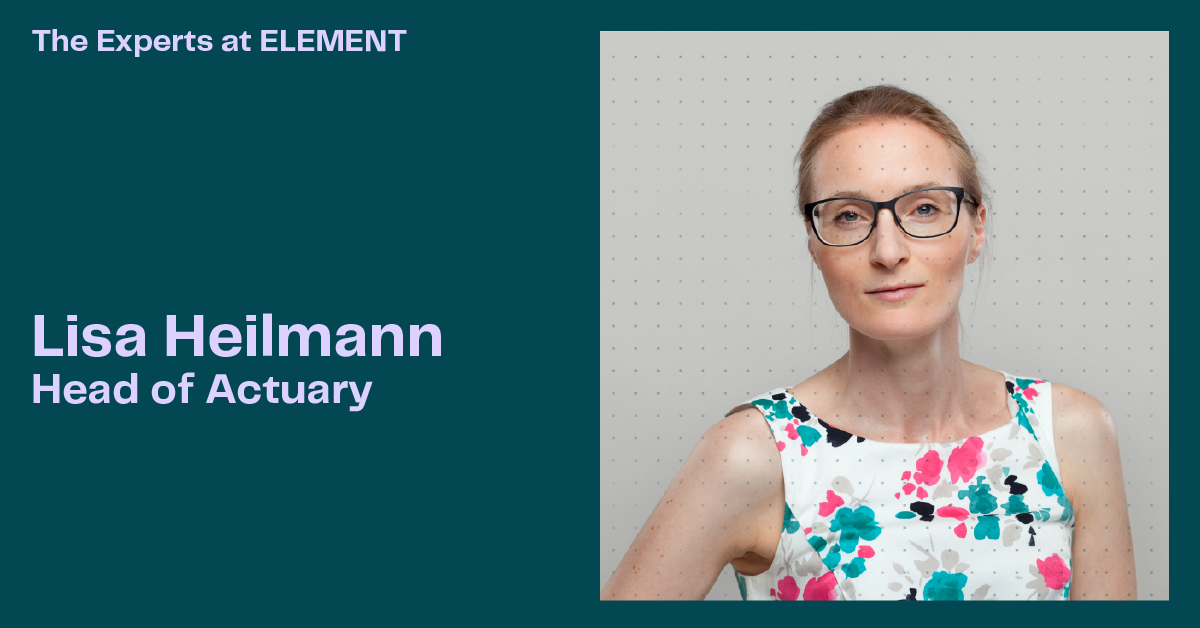
The Experts at ELEMENT: - Lisa Heilmann (She/Her)
At ELEMENT, the future of insurance can't be accomplished without talented people, innovative ideas, and modern technology. The Experts at ELEMENT series sheds light on pioneers of innovation and technology in our various departments. The goal is simple: to identify and celebrate our experts, their contributions to the future of insurance, and delve more into how they succeed each day at what they do.
Our guest in this issue is Lisa Heilmann who is the Head of Actuary at ELEMENT.
Hello Lisa, can you tell me a bit about yourself and what you do at ELEMENT?
Hello Jacob. I am the Head of the Actuarial department at ELEMENT, and I have been with ELEMENT for over five years. My main responsibility is the quarterly and year-end reserving, which, amongst other things, means that we have to calculate reserves for claims which happened in the past, but which haven’t been reported to ELEMENT yet. My colleague and I are also responsible for the sign-off of the premium calculators, that is; where we calculate how much our insurance covers cost.
At what moment did you decide you wanted to pursue a career in insurance, specifically Actuary?
I studied Business Mathematics and as a pathway, I chose actuarial studies. In the course of my time at university, I did several internships at different insurance related companies and this somehow convinced me to look at a future in the insurance sector!
How does a typical day look like for you?
During the quarterly and year-end closing, I focus on calculating the reserves. This involves a lot of data checking to make sure that we are using the correct input data and data reconciliation, but of course also the actual calculations. The results then have to be documented and discussed with different departments, as the reserves can have quite an impact on the balance sheet. Between the quarters, I try to update our reserving tools to fit the growing business, keep up with the changing requirements from the regulators (BaFin) or answer questions from auditors. There are also the premium calculators, which are prepared by the pricing team, but need to be signed-off by the actuarial department. I am still waiting for a typical day to start!
Are there any strengths which you think are most important to be successful in your role?
The use of Excel is still quite significant and relevant in Actuary, so one should not be afraid of spreadsheets. This comes in handy, particularly during the times of closing, as it is helpful to be able to really focus and pay attention to the smallest of details. Last but not the least, documentation and communication of the results becomes more and more essential because it ensures all relevant stakeholders are aware and informed to make better decisions.
What are some challenges you faced in your career, and how did you handle them?
Prior to working at ELEMENT, I worked for a very big and renowned insurance company which has many years of claims experience. There was a big actuarial team and the reserving process was very structured. Then I started at ELEMENT, where I was one of only seven people in total, and the only thing there was in terms of actuarial tools was a laptop with Excel. No reserving tools, no pricing tools. So we had to set up everything from scratch. In terms of building the tools, my previous work experience really helped me. In terms of lack of data because ELEMENT didn’t exist before, we had some assistance from an actuarial consultancy. This really helped, but as ELEMENT is coming up with new insurance products all the time, I think you just have to try to get a bit more comfortable with sparse data, which is not always easy as an actuary.
What is the most interesting project you have worked on?
This is a tough question, as ELEMENT constantly comes up with new ideas for insurance products. I think what I find intriguing is that my previous job and my job at ELEMENT are so different from each other, even though the main task is reserving. One project I remember was when we worked together with a partner on a parametric weather insurance. It was exciting to understand and challenge the weather model which the partner had built, and to realize that there is a lot of detailed data on the weather publicly available.
Are there any development tools or resources you could recommend for anyone looking to branch into Actuary?
If you want to become an actuary in Germany, a degree in Mathematics or a related field is definitely an advantage. In order to then become a qualified actuary, one needs to pass quite a few actuarial exams. So if you are toying with the idea of becoming an actuary, maybe start with an internship at an actuarial department of an insurance company to determine if that is something you want to commit to. You can also check out this website from the German Actuarial Association to get a better idea of what an actuary is doing. On the left side of the webpage, you will find the different fields that actuaries usually work in. 😉
Lastly, what advice do you have for anyone looking to join the teams at ELEMENT
If you are looking for a job that doesn’t get boring and where you can work with people from lots of different backgrounds, be it personal or professional, ELEMENT is the place to be!

